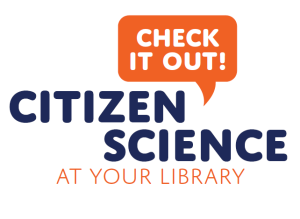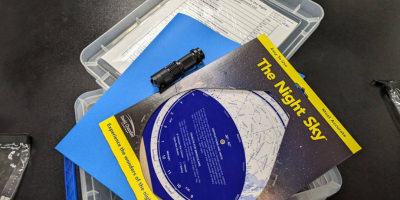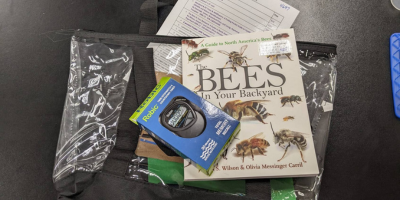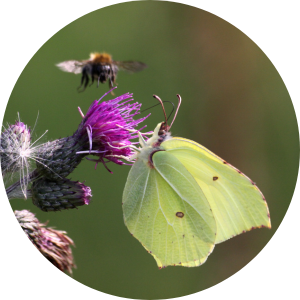What is Citizen Science?
Citizen Science is ordinary people of any age gathering scientific information locally and sharing it with the global scientific community. Whether you are participating in star finding, birdwatching, sharing pictures from your backyard to help track plant and species populations, or taking a walk in your neighborhood with an air monitor, you can contribute! Citizen Science is perfect for all ages and great for family activities.
Today’s opportunities to participate in Citizen Science are boundless. Odds are there is a citizen science project that coincides with any hobby, interest or curiosity that you may have. Participating is easy! Often, you can use your mobile phone or the internet to collect and submit observations and to see results.

Citizen Science Kits
Citizen Science Kits are now available for checkout at Lexington Park Library! Click on the title of a kit below to see it in the catalog and place a hold. Kits check out for 21 days and can be renewed up to four times if there are no holds. Kits must be checked out and returned at the Information Desk at Lexington Park Library.

Measuring Light in the Night
This kit introduces participants to the Globe at Night project, an international citizen science project that involves the public in measuring and collecting night sky brightness observations to help scientists understand the impact of light pollution. Light pollution is intrusive artificial (usually outdoor) light that can have negative consequences. The good news is that it’s relatively easy to fix! This kit contains resources to help you learn about and monitor light pollution near you. This kit was made using the SciStarter Measuring Light in the Night guide.
Kit Materials:
- Activity Guide
- Data Worksheet
- Sky Quality Meter-L (SQM-L) (Do not substitute) – Hand-held meter for measuring sky brightness.
- Red LED flashlight – To guide to nighttime viewing areas without disrupting user night vision or nocturnal animals who are less sensitive than humans to the red range of light.
- Planisphere – Rotating star finder that helps identify constellations at any time of night during the year.
- Folder with additional documents
- Storage bin

Observing Pollinators
This kit introduces participants to The Great Sunflower Project to better observe pollinators in the community. This kit is for you to help scientists understand and respond to changes in pollinator populations and the types of flowering plants that pollinators prefer by observing any flowering plant for at least five minutes, counting and identifying the pollinators that visit the plant, then logging data online. This kit was made using the SciStarter Observing Pollinators guide.
Kit Materials:
- Activity Guide
- Data Sheet
- Binoculars 10×25 Compact
- Stopwatch
- Mini Clipboard
- The Bees in Your Backyard: A Guide to North American’s Bees
- Maryland & DC trees & wildflowers: a folding pocket guide
- Field Notebook
- Folder with additional documents
- Clear plastic tote bag
This kit introduces participants to Cornell University Lab of Ornithology Celebrate Urban Birds (CUBs) project an in-depth project focused on birds, stewardship, and citizen science. This kit’s components provide resources to help you to learn to identify your neighborhood birds, pick a time and place to watch birds for only 10 minutes, make observations on 3 separate days, transfer your observations to the Data Sheet, and then logging data online. This kit was made using the Cornell CUB materials and the SciStarter Exploring Biodiversity guide.
Kit Materials:
- Activity Guide
- Binoculars 10×25 Compact
- Mini Clipboard
- Peterson Field Guide to Birds of Eastern and Central North America by Roger Tory Peterson
- Field Notebook
- Folder with additional documents
- Clear plastic tote bag

Citizen Science Events
Learn how you can participate in Citizen Science! Events are open to all ages, from upper elementary age students to adults. Please use the “add more people” button when registering to let us know how many people will be attending.

Project Butterfly & Bumblebee
Saturday, May 3, 10 – 11:30 a.m.
Lexington Park Library
Register for Project Butterfly and Bumblebee
Susan Polsky, from the Association of Southern Maryland Beekeepers, will teach us how to help the state increase pollinator habitats. Through Project Butterfly & Bumblebee, the Maryland Park Service is committed to increasing pollinator habitat on public lands, educating the public about pollinators, and supporting programs and events that highlight the important role pollinators play in maintaining the nation’s food supply and healthy and diverse ecosystems.
SciStarter
Find thousands of additional projects you can participate in using the Project Finder on SciStarter. Create a SciStarter.org account to track your progress, receive personalized recommendations, learn about local events and to connect with project scientists and other citizen scientists.
Thank you to The Patuxent Partnership for supporting this series of events and the creation of kits!

